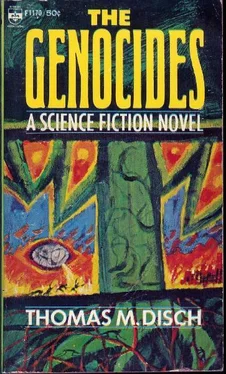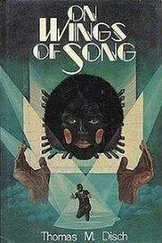Blossom, under the unaccustomed weight of responsibility, became erratic, running from rock to rock. “Here!” she would say, and then, running: “Or here?” She was a good two hundred yards from the old pier, and Buddy began to doubt that there was a cave.
If there were not, then surely they had come to an end.
The prospect of death disturbed him most in that he could not grasp the purpose of these burnings. If this were an invasion (and even his father could not doubt that now; the Good Lord did not need to build machines to wreak his vengeance), what did the invaders want? Were the Plants themselves the invaders? No, no—they were only Plants. One had to suppose that the real invaders—the ones inside the incendiary globes (or whoever had built them and put them to work)—wanted the Earth for no other reason than to grow their damn Plants. Was Earth, then, their farm? If so, why had there been no harvest?
It wounded his pride to think that his race, his species, his world was being defeated with such apparent ease. What was worse, what he could not endure was the suspicion that it all meant nothing, that the process of their annihilation was something quite mechanical: that mankind’s destroyers were not, in other words, fighting a war but merely spraying the garden.
The opening to the cave was discovered inadvertently—Denny Stromberg fell through it. Without that happy chance, they might well have gone the whole night without finding it, for everyone in their party had passed it by.
The cave went farther back than the lamplight would reach from the entrance, but before the full depth was explored, everyone was inside. All the adults except Anderson, Buddy, and Maryann (all three under five feet six) had to bend over double or even crawl to keep from hitting their beads against the crumbling ceiling. Anderson declared that the moment for silent prayer was at hand, for which Orville was grateful. Huddled next to each other for warmth, their backs against the sloping wall of the cave, they tried to recover their sense of identity, of purpose, of touch—whatever senses they had lost in the hours-long stampede through the snow. The lamp was left burning, since Anderson judged that matches were more precious than oil.
After five minutes given over to prayers, Anderson, Buddy, Neil and Orville (though not of the family hierarchy, he had been the one to think of the cave—and of more things besides than Anderson cared to reckon) explored the back of the cave. It was big but not so big as they’d hoped, extending some twenty feet to the rear, narrowing continually. At its far end, there was a small el filled with bones.
“Wolves!” Neil declared.
Closer inspection confirmed this with some definiteness, for the skeletons of the wolves themselves were discovered, stripped as clean as the others, topmost on the pile.
“Rats,” Neil decided. “Just rats.”
To reach the far depth of the cave they had had to squeeze past the gigantic root of a Plant that had broken through the cave wall. Returning from the pile of bones the men examined this, the only other exceptional feature of the cave, with some care. The Plant’s root at this level was very little distinguishable from its trunk. To judge from the curvature of the portion exposed in the cave, it was, like the bole of the Plant, some fourteen or fifteen feet in diameter. Near the floor of the cave, the smooth surface of the root was abraded, just as the smooth green trunks were often chewed by hungry rabbits. Here, however, there appeared to be more than a nibble taken out.
Orville stooped to examine it. “Rabbits didn’t do this. It’s gone right to the heart of the wood.” He reached his hand into the dark hole. The outermost layer of wood extended no more than a foot, beyond which his fingers encountered what seemed a tangle of vines—and beyond this (his whole shoulder pressing against the hole), nothing; emptiness; air. “This thing is hollow!”
“Nonsense,” Anderson said. He got down beside Orville and thrust his own arm into the hole. “It can’t be,” he said, feeling that it could be and was.
“Rabbits certainly didn’t make that hole,” Orville insisted.
“Rats,” Neil repeated, more than ever confirmed in his judgment. But, as usual, no one paid him any attention.
“It grows that way. Like the stem of a dandelion—it’s hollow.”
“It’s dead. Termites must have gotten to it.”
“The only dead Plants I’ve seen, Mr. Anderson, are the ones we’ve killed. If you don’t object, I’d like to see what’s down there.”
“I don’t see what good that could do. You have an unhealthy curiosity about these Plants, young man. I sometimes have the impression that you’re more on their side than on ours.”
“The good it could do,” Orville said, half-truthfully (for he dared not yet express his real hope), “is that it may provide a back door to the cave—an escape hatch to the surface in the event that we’re followed here.”
“He’s right about that, you know,” Buddy volunteered.
“I don’t need your help to make up my mind. Either of you,” Anderson added when he saw that Neil had begun to smile at this. “You are right again, Jeremiah…”
“Just call me Orville, sir. Everyone else does.”
Anderson smiled acidly. “Yes. Well. Shall we start to work now? As I recall, one of the men managed to bring a hatchet. Oh, it was you, Buddy? Bring it here. Meanwhile, you—” (designating Orville) “—will see that everyone moves to the back of the cave, where they’ll be warmer. And safer perhaps. Also, find some way to block up the entrance, so the snow will cover it over again. Use your coat if necessary.”
When the opening to the root had been sufficiently enlarged, Anderson thrust the lamp in and squeezed his bony torso through. The cavity narrowed rapidly overhead, becoming no more than a tangle of vines; there was little possibility of an exit—at least not without much hard work. But below was an abyss that stretched quite beyond the weak shaft of light from the lamp. The lamp’s effectiveness was further diminished by what seemed to be a network of gauze or cobweb that filled the hollow of the root. The light passing through this airy stuff was diffused and softened so that beyond a depth of fifteen feet one could discern only a formless, pinkish glow.
Anderson swiped at these strands of gauze, and they broke unresistingly. His calloused hand could not even feel them giving away.
Anderson squirmed back out of the narrow hole and into the cave proper. “Well, it won’t be any use to escape by. It’s solid up above. It goes down , though—farther than I can see. Look for yourself if you want.”
Orville wormed into the hole. He stayed there so long, Anderson became annoyed. When he reappeared he was almost grinning. “That’s where we’ll go, Mr. Anderson. Why, it’s perfect!”
“You’re crazy,” Anderson said matter-of-factly. “We’re bad enough off where we are.”
“But the point is—” (And this had been his original, unexpressed hope.) “—that it will be warm down there. Once you get fifty feet below the surface, it’s always a comfortable fifty degrees Fahrenheit. There’s no winter and no summer that deep in the ground. If you prefer it warmer than that just go down deeper. It warms up one degree for every sixty feet.”
“Ah, what are you talking about?” Neil jeered. “That sounds like a lot of hooey.” He didn’t like the way Orville—a stranger—was telling them what to do all the time. He had no right!
“It’s one thing I should know about, being a mining engineer. Isn’t that why I’m alive, after all?” He let that sink in, then continued calmly: “One of the biggest problems in working deep mines is keeping them at a bearable temperature. The least we can do is see how far down it does go. It must be fifty feet at least—that would be only a tenth of its height.”
Читать дальше












